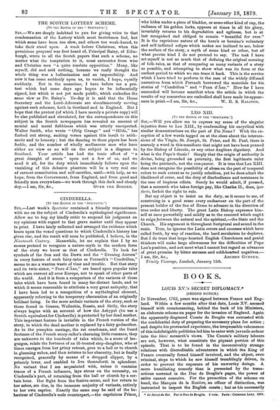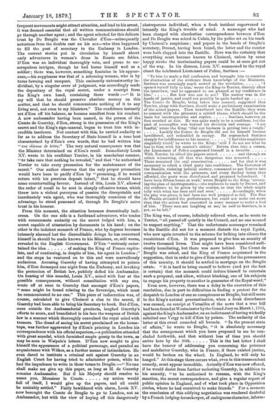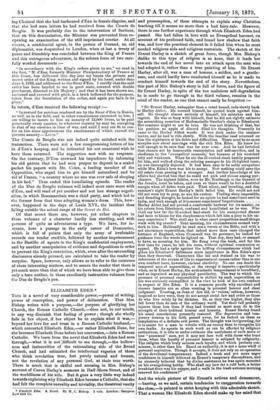BOOKS.
LOUIS XV.'s SECRET DIPLOMACY.* [SECOND NOTICE.]
IN November, 1762, peace was signed between France and Eng- land. Within a few months after that date, Louis XV. amused himself with countenancing, behind the back of his Ministers,. an elaborate scheme on paper for the invasion of England. Again. the apparently disgraced Comte de Broglie was entrusted with the confidential duty of preparing the necessary plans for action and despite his protracted experience, the irrepressible vehemence of this indefatigable politician led him to enter with juvenile ardour into the blasé monarch's views. The Comte's military labours. are not, however, what constitute the piquant portion of this- episode. That is to be found in the inconceivably strange- relations with discreditable adventurers in which the King of France eventually found himself involved, and the abject, even' criminal, steps to which he saw himself tremblingly driven, in order to prevent the exposure of his unworthy doings. A. more humiliating comedy than is presented by the trans- actions narrated in the Dac de Broglie's pages, the power of satire cannot conceive. For the promotion of the scheme. on• hand, the Marquis de la Roziere, an officer of distinction, was
to inspect the English coasts ; but as his necessarily
* Le secret du Rot. Par le Duc de Broglie. 2 vole. Perin : Calmann Levy. 1879.
frequent movements might attract attention, and lead to his arrest, it was deemed essential that all written communications should go through another agent ; and the agent selected for this delicate 'trust by De Broglie was the Chevalier d'Eon—subsequently notorious from the doubts cast on his sex—who then happened to fill the post of secretary to the Embassy in London. The current stories put in circulation by himself about early adventures in woman's dress in Russia are fables. D'Eon was an individual thoroughly vain, and prone to un- scrupulous intrigue, though he had borne himself well as a soldier ; there was, however, something feminine in his appear- ance,—his suppleness was that of a scheming woman, who is by turns fawning and rampant. This eminently untrustworthy in- dividual, by a singular error of judgment, was accordingly made 'the depositary of the royal secret, under a rescript from the King's own hand, containing these words :—" It is my will that he should preserve absolute secrecy on this matter, and that he should communicate nothing of it to any living soul, not even to my Ministers." The confidence instantly set d'Eon off his balance, as became manifest from his conduct. A new ambassador having been named, in the person of the 'Comte de Guerchy, d'Eon, strong in the possession of the King's secret and the King's sign-manual, began to treat him with in- credible insolence. Not content with this, he carried audacity so far as to address the Secretary of State himself in a tone best characterised by d'Eon's own words, that he had written him "une chienne de lettre." The very natural consequence was that the Minister determined on d'Eon's recall. Immediately Louis XV. wrote to his confidant Tercier, in his nonchalant manner, -" to take care that nothing be revealed," and that "he authorised Tercier to take every precaution for the maintenance of the secret." Our author observes that the only proper precaution would have been to pacify d'Eon by "promising, if he would return with his precious deposit intact," that he should have some countervailing favour. Instead of this, Louis XV. allowed the order of recall to be sent in sharply offensive terms, which threw into a violent paroxysm of passion the disreputable and inordinately vain agent, who was thoroughly conscious of the advantage he stood possessed of, through De Broglie's naïve -trust in his honour.
From this moment, the situation becomes dramatically ludi- -crous. On the one side is a furibrand adventurer, who trades with consummate audacity on the secret lodged with him, a secret capable of attestation by documents in his hand ; on the other is the indolent monarch of France, who by degrees becomes intensely alarmed lest the discreditable doings he has concerned himself in should be made known to his Ministers, or, stilt worse, revealed to the English Government. D'Eon " seriously enter-
tained the idea of making the King of France capitu- late, and of continuing, in despite of him, his agent in London ;" -and the steps he ventured on to this end were marvellously audacious. Accusing Guerchy of having attempted to poison shim, d'Eon decamped one night from the Embassy, and invoking the protection of British law, publicly defied his Ambassador. On hearing of this scandal, Louis XV., seized with fear at the possible consequences, without consultation with any one, wrote off at once to Guerchy that amongst d'Eon's papers, 4' some might be found relating to the Sovereign, which must be communicated to no one." This piece of indiscretion was, of -course, calculated to give Choiseul a clue to the secret, if Guerchy had been able to bring his Secretary to book. But d'Eon, -once outside the Ambassadorial precincts, laughed Guerchy's efforts to scorn, and brandished in his face the weapons of British law in a manner which thoroughly convulsed the royal mind with tremors. The dread of seeing his secret proclaimed on the house- tops, was further aggravated by d'Eon's printing in London his correspondence with his official superiors, —a publication attended with great scandal, which furnished ample gossip to the town, as may be seen in Walpole's letters. D'Eon now sought to give himself the appearance of a political personage, and paraded an acquaintance with Wilkes, as a further means of intimidation. He -even dared to institute a criminal suit against Guerchy in an English Court for having tried to administer poison, while he had the impudence to write in these terms to Broglie :—" No one shall make me give up this paper, as long as M. de Guerchy remains Ambassador. But if his Majesty should resolve to
name you, Monsieur le Comte my action would fall of itself, I would give up the papers, and all could be amicably settled." Fairly bewildered with alarm, Louis XV. now besought the Comte de Broglie to go to London, not as Ambassador, but with the view of buying off this dangerously obstreperous individual, when a fresh incident supervened to intensify the King's trouble of mind. A messenger who had been charged with clandestine correspondence between d'Eon and De Broglie was seized in Calais, by the police set on his track by Choiseul's suspicions ; and papers in the hands of Broglie's secretary, Drouet, having been found, the latter and the courier were both clapped into the Bastille. Here was the certainty that everything must become known to Choiseul, unless by some happy stroke the incriminating papers could be at once got out of the way. In his distress, Louis XV. summoned to the royal closet the celebrated Lieutenant of Police, Sartines
:- "To him he made a full confession, and besought him to contrive the abstraction of the evidence from knowledge of the Ministers. Sartines was seemingly much moved at the revelation I opened myself fatly to him,' wrote the King to Tercier, directly after the interview, and he appeared to me pleased at my confidence in
him.' But how was one to act ? The matter was in the hands of justice, and could not possibly be quite hushed up The Comte de Broglie, being taken into counsel, suggested that Tercier, along with Sartines, should make a preliMinary examination of the seized papers. Then introduced into the Bastille, they were to concert with the prisoners a settled theme, which should be the basis for interrogatories and replies Sartines, however, at first recoiled at this. He was quite ready to be a confidant, bnt the part of accomplice was beyond his devotion and courage. I am fearful,' wrote the King, 'that our business is getting into a tangle.'
Luckily the Comte de Broglie did not let himself become bewildered, and redoubled in energy. He reproached Sartines sharply for indifference to his master I find this magistrate singularly timid,' he wrote to the King; still I do not see what ho has to fear, with his master's orders.' Driven thus into a corner,
the Lieutenant of Police suppressed himself in a tremble
With Tercier, he sifted the papers seized and through an adroit winnowing, all that was dangerous was removed There remained the oral examination and for that it was necessary to admit a third party into confidence. The Governor of the Bastille, violating judicial secrecy, consented to put Tercier into communication with the prisoners, and every facility being thus afforded, the parts were distributed and prepared beforehand. I have been fifteen hours at work,' wrote Broglie to the King, 'arrang- ing the plan of interrogatories,—the replies to be made by Drouet, and the evidence to be given by the courier, so that the whole might
tally with what has been said and seen' Accordingly, when the play was given, it had been too well prepared to fail. The Dun de Praslin attended the performance, but could not make out more than that the actors had concerted in some manner to make a fool of him. Those men are laughing at me,' he said to Sartines, in a pet, as he left."
The King was, of course, infinitely relieved when, as he wrote to Tercier, " all passed off quietly in the Council, and no one seemed to suspect anything." That the unfortunate messenger remained in the Bastille did not for a moment disturb the royal Egoist, who now again reverted to the scheme for bribing into silence the recalcitrant d'Eon. It was proposed to give him an annuity of twelve thousand livres. That might have been considered suffi- ciently humiliating, but there was more behind. The Count de Broglie was asked, and the King of France acquiesced in the suggestion, that in order to give d'Eon security for the permanence of this annuity, it should be settled in mortgage on the Broglie estate. " It is hard to bring oneself to believe (and yet the fact is certain) that the monarch could induce himself to entertain such a proposal, and allow, without blushing, one of his subjects to engage his property to another in guarantee of the Royal word."
Even now, however, there was a delay in the execution of this resolution, due in part to difficulties in finding a pretext for the despatch to London of one so conspicuous as Broglie, but still more to the King's natural procrastination, when a fresh disturbance was caused, on receipt at Versailles of the news that a true bill had been found at Westminster by the Grand Jury on March 1,1765, against the King's Ambassador, on an indictment of having wickedly solicited one Vergy to kill d'Eon by poison. The audacity of the latter at this event exceeded all bounds. " In the present state of affairs," he wrote to Broglie, " it is absolutely necessary that the arrangement which you have proposed to me be con- cluded forthwith, and that without loss of time you should
arrive here by the 20th This is the last letter I shall have the honour of addressing you concerning the poisoner and malefactor Guerchy, who in France, if there existed justice, would be broken on the wheel. In England, he will only be hanged." At this stage there occurs what, even in this transcendent comedy, must appear incredible. Actually d'Eon was now offered, if he would desist from further molesting Guerchy, in addition to his annuity, " to be authorised to resume, with the King's sanction, the secret correspondence, and give a regular report of public opinion in England, and of what took place in Opposition circles, where he had contrived to make friends." For a moment the conclusion of this edifying negotiation was rendered doubtful by a French lodging-housekeeper, of ambiguous character, inform-
ing Choiseul that she had harboured d'Eon in female disguise, and that she had seen letters he had received from the Comte de Broglie. it was probably due to the intervention of Sartines, that on this denunciation, the Minister was prevented from re- opening an examination of the still imprisoned courier. At all events, a confidential agent, in the person of Durand, an old diplomatist, was despatched to London, when at last a treaty of peace and friendship was concluded between the King of France and this outrageous adventurer, in the solemn form of two care- fully worded documents :—
" In accordance with the King's orders given to me," we read in the first, " M. d'Eon, formerly Minister Plenipotentiary of France at this Court, has delivered this day into my hands the private and secret order of the King, written and signed by his hand, under date June 5, 1763, and addressed to the Sieur d'Eon. I certify that the said order has been handed to me in good state, covered with double parchment, directed to his Majesty ; and that it has been shown me, endorsed and covered with pitch, in a brick hollowed for the purpose, taken from the foundation of the cellar, and again put back in its place."
In return, d'Eon received the following receipt :-
" In reward for services rendered me by the Sieur d'Eon in Russia, as well as in the field, and in other commissions entrusted to him, I am willing to insure to him an annuity of 12,000 livres, to be paid punctually every quarter, in whatever country he may be, excepting in that of my enemies in time of war, and until I may see fit to con- fer on him some appointment the emoluments of which exceed the present annuity.—Louis."
The Comte de Broglie was not indeed quite satisfied with the transaction. There were not a few compromising letters of his
in d'Eon's keeping, and he intimated his not unnatural wish to have them returned. The suggestion met with no response. On the contrary, D'Eon crowned his impudence by informing his old patron that be had seen proper to deposit in a sealed
packet his papers with Mr. Cotes, a leading member of the Opposition, who urged him to get himself naturalised and be
rid of France, "a country where no one was ever safe of sleeping in his bed." Thus ended this humiliating episode. The reader of the Duc de Broglie volumes will indeed meet once more with d'Eon, and will read of yet another and not less strange negoti- ation, in which Beaumarchais was a chief party, and which led to the former from that time adopting woman's dress. This, how-
ever, happened in the days of Louis XVI., the incident thus falling outside the actual range of the Secret du Roi.
Of that secret there are, however, yet other chapters in these volumes of a character hardly less startling, and with persons of quite as adventurous a type. We have, for in- stance, here a passage in the early career of Dumouriez, which is full of points that only the array of irrefutable records can render credible, followed by another imprisonment in the Bastille of agents in the King's confidential employment, and by another manipulation of evidence and depositions in order to prevent the King's conviction, which, even after the astounding disclosures already perused, are calculated to take the reader by surprise. Space, however, only allows us to refer to the existence of these interesting matters, and to assure the reader that there is yet much more than that of which we have been able to give them only a bare outline, in these excellently instructive volumes from the Due de Broglie's pen.




































 Previous page
Previous page